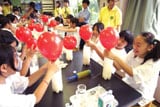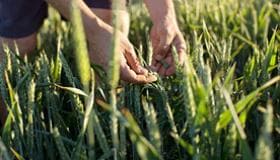Making Science Make Sense
Bayer actively fulfills its corporate responsibility to society, and works to practice responsible management and corporate activities by setting its own targets concerning social responsibility and introducing guidelines for corporate governance, legal compliance and corporate responsibility. Bayer's objective is to increase the value of the Bayer Group over the long term by generating high added-value to benefit stockholders, employees and the societies of each country where Bayer operates. Bayer believes that contributing to the benefit of society will advance the achievement of its corporate objectives.
Bayer in Japan also actively fulfills its role and responsibilities as a corporate citizen by contributing to society in the fields of health care and science education as a member of the worldwide Bayer Group.
Generating a Deeper Understanding of Science among Children through the Educational Program “Making Science Make Sense”

a hands-on, inquiry-based
science experiment classroom,
is run by Bayer employee
volunteers.
As one of Bayer’s social activities in Japan, the “Making Science Make Sense” educational program was first introduced in 2002. This program was modeled on a similar initiative launched by Bayer in the U.S. in 1992 with the aim of deepening the understanding of science among students and young children. In 2006, Bayer in the U.S. received the Ron Brown Award for Corporate Leadership, the only presidential award to honor companies for the exemplary quality of their relationships with local communities.
In an effort to nurture increased interest and a deeper understanding in the study of science among children, Bayer distributed the practical guidebook “Making Science Make Sense” to 24,000 elementary schools across Japan in February 2002. Complementing this endeavor, Bayer commenced “Waku-Waku Jikken Bikkuri-bako (exciting jack-in-a-box),” a hands-on, inquiry-based science program in 2003. Under this program, employees of Bayer in Japan visit elementary schools across Japan once a year.





